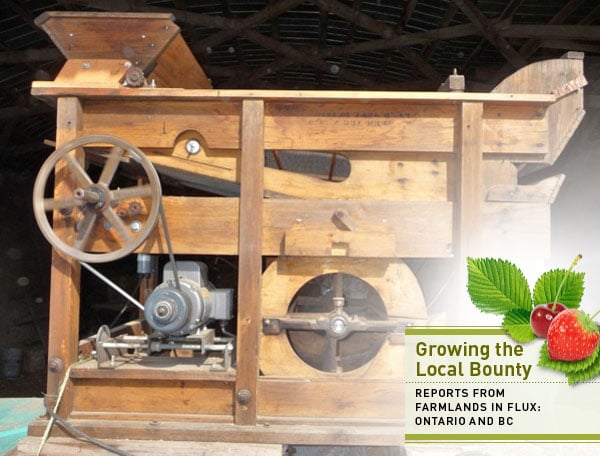At 90 years old, Clipper is still as active as ever. She's had a few parts replaced, tuned and added, but she is still the same machine she was nearly a century ago. After sitting idle for several decades, she was on her way to the Chilliwack dump last year when Jim Grieshaber-Otto rescued and refurbished her to use at Cedar Isle, his 94-acre farm in Agassiz.
The Clipper #6, an antique grain cleaner manufactured in the 1920s, is a sign of the times. Or rather, a sign of the return to a time when small-scale farming was the norm and certain local products weren't so hard to find. Produce has been the low-hanging fruit for many people wishing to eat local. But local dry goods including wheat, the staff of life, is much more difficult to source in British Columbia. As demand grows, however, more farmers are experimenting with wheat production. What's lacking, they say, is ready infrastructure to process that wheat -- which is why clunkers like the Clipper are forced out of retirement.
100-mile diet authors spurred grain growth
Until recently, Grieshaber-Otto was just growing a few acres of wheat and oats for his livestock. All that was required was a combine; the horses and cattle didn't need it hulled, cleaned or milled into flour.
Then two years ago, he heard Alisa Smith and James MacKinnon on the CBC talking about the 100-mile diet quest and how difficult it was to find local wheat. "I popped them an email saying, what would you like?" he says. And it snowballed from there. The following year, Martin Twigg and Ayla Harker approached him and said they wanted to start an urban grain CSA (community supported agriculture) in the Fraser Valley, similar to the one in the Kootenays. Would he grow wheat for them?
"The possibility of growing a crop that was higher value than hay, the economic benefit, was attractive. Also making connections with people who wanted high quality food and wanted to know where it was coming from," says Grieshaber-Otto when asked why he decided to jump on board. "And to be honest, Ayla and Martin were so enthusiastic. It was hard to say no."
That's when he learned "through friends of friends of friends" that a Clipper #6, a brand of grain cleaner manufactured in the 1920s, was available. Once grain has been harvested with a combine (which separates the grain from the stalk, or straw, and then from the inedible chaff around it) it requires cleaning to remove any remaining bits of chaff, straw and foreign seeds. The Clipper does this by sifting the grain through a series of screens.
Cleaning and milling is a "key step along the way, and it's one that I think is lacking in the Fraser Valley," says Grieshaber-Otto. The Urban Grains CSA, which is now managed by Farm Folk/City Folk, has 250 members, about twice as many as they had their first year. With their support he was able to purchase a more modern grain cleaner to clean kernels to an even higher standard.
Their support has also allowed Grieshaber-Otto to increase production and experiment with different types of heritage wheat varieties. "We try and view our farm as part of the community and we like to talk about it that way," he says. "Because we feel it really truly is. I don't consider myself to be the farmer. I couldn't do my job if my wife Dianne didn't have a teaching job in town. It's not about an individual, but rather about a collective cooperative enterprise."
'You have to be really clever at refurbishing'
Joanne and Drew Gailius have been growing grain on their Creston farm, Full Circle Farms, for five years, with the help of CSA members. The first two years they pressed their fresh-milled flours upon friends and family, says Joanne. The following year they joined two other farms that were growing wheat for the 600-member strong Kootenay Grain CSA (the first in B.C.), and in 2009 they branched off with their own CSA, which quickly attracted 75 members, the maximum they can handle for now.
The Gailius' grow Red Fife and Hard Spring varieties of wheat, along with spelt, oats, rye and garbanzo beans on about one-quarter of their 40-acre property. Once the grains are harvested, using a combine that separates the grain part from the stem, it has to be hulled and cleaned.
"We have seven different machines," says Joanne, who grew up on a large farm in the Fraser Valley. "All of them we found from old retired small farms from here to Manitoba... one of these was built in 1952. These are really old things but because of his skill he's able to rebuild them. My husband is a heavy-duty mechanic as well as an organic farmer."
"It's very hard to find anything small-scale, and you have to be really clever at refurbishing," she adds. "But we really believe it's the future of our food."
While Full Circle does the grain cleaning, members have the option of taking it to Nelson or Creston, where there are mills that do small-batch processing.
Although a small percentage of the Urban Grains' members mill their own grain at home, the majority don't. For the people who do want flour, the grain is delivered to Anita's Organic Grain and Flour Mill Ltd., a Chilliwack mill that processes it's own brand of organic flours and also offers "toll milling" services.
"They've been superb, wonderful to work with," says Grieshaber-Otto. "Having them as a resource makes it possible. If we didn't have that, [the grain] would have to be trucked up to Armstrong."
John Mackenzie, president of Anita's, says that they are asked on a regular basis where the grain for their flours comes from. He says, besides Cedar Isle, they source from the Peace Region and the Okanagan in B.C. "For us local is very important because it's important to our customers; however we will buy product first on quality and availability and then on how close it is to my mill," Mackenzie explained in an email.
"For example, southern Alberta is a great place to buy grain -- great product, lots of supply, and it's only a full day's drive away. People also need to remember that local doesn't just mean from Canada -- eastern Washington is a hot bed for grain growing."
This, says Mackenzie, opens the debate of whether we should buy Canadian products before we buy local products (Washington, after all, is closer than Regina). Also, he points out, as does Grieshaber-Otto, the Fraser Valley is a difficult place to grow grain, in part because of the climate, but in part because wheat crops need more space and land costs are so high.
"If you're counting on everything being in grain it's not going to be easy," says Grieshaber-Otto. "I think people should go into it knowing it's a risky crop."
Grow the post-harvest infrastructure
"The production of grains are challenging and does require some things in terms of machinery and a certain level of knowledge and a certain type of land," agrees Chris Hergesheimer, a co-organizer of the Urban Grains CSA who is also known as the Flour Peddler.
Hergesheimer started his Roberts Creek-based business three years ago, milling locally sourced grain mostly for friends and neighbours on the Sunshine Coast. Since then it's grown exponentially, and his customer base has expanded to include many in Vancouver. In his first year, he milled 57 kilograms of flour, the second he did 250 kilograms, this year he was up to 1,500 and next year he expects to double that.
Hergesheimer uses small stone mills, "more like table-top mills" that have been sufficient to handle his volumes so far. It takes him six to eight hours to process 100 one-kilogram bags to take to farmers' markets.
"But I'm not able to meet huge demand," says Hergesheimer. "I turn down bakery or restaurant orders that may need 50 kilograms of flour in one shot. The scale of my business is very small batch, because I can't compete economically with a big mill. All I have to go on with the business is that fact that my grain is sourced from very close by -- all of it comes from southern B.C., and that my flour's fresh."
Hergesheimer says he could probably sell his product in stores. "It would be challenging in terms of price and consistency and volume," he explains. "And a big, big part of what I do is educating people about flour, and so to have a bag of flour on the shelf, it can't speak for itself. Having that available in stores at this point, I'd have to see more uptake from the general public to necessitate that next step and going through those requirements."
So what are the options to grow the supply of local flour in B.C.? Either small processors like himself will have to get slightly bigger, says Hergesheimer, or a whole lot more will have to come onboard. Either way, we need to start increasing post-harvest infrastructure.
Even in what Hergesheimer calls "short" grain chains, there are at least four or five processing steps -- from combining, to drying, hulling, cleaning and milling.
"We need to grow the harvest alongside the post-harvest infrastructure," he says, "in order to make sure that the post-harvest infrastructure is in place and is solid to meet that demand if someone were to produce a hundred tonnes of wheat one year and it’s great wheat.
"It's an important endeavor to chase down that next set of infrastructure." ![]()
Read more: Local Economy, Environment

















Tyee Commenting Guidelines
Comments that violate guidelines risk being deleted, and violations may result in a temporary or permanent user ban. Maintain the spirit of good conversation to stay in the discussion.
*Please note The Tyee is not a forum for spreading misinformation about COVID-19, denying its existence or minimizing its risk to public health.
Do:
Do not: